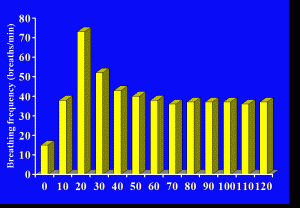This is primarily a swimming-related piece, but I’m cross-posting it at my other site since it also touches on fitness.
In early 2008, the editors over at The Science of Sport did a fantastic two article series on Exercise in the Cold. I’m going to focus on the second part of the series since it talks about swimming. But the information is relevant to anyone who exercises in the elements.
Hyperventilation
First, what I really like about the piece is that it addresses the “cold shock response.” This is the physiological phenomenon that a swimmer or triathlete experiences when he or she suddenly plunges into cold water without properly preparing the body for this radical change of state. Per the authors:
One of the first things you experience when submerging yourself in cold water is something called the “cold-shock response.” This is characterized by an uncontrollable gasp for air, followed by a prolonged period of hyperventilation – more rapid breathing… the hyperventilation that happens in the cold has a profound effect on the ability to swim in an efficient manner [ed. – emphasis mine].
This is a key takeaway. Why? Because once the cold shock response is triggered – and the athlete’s respiration rate is elevated – it stays elevated for several minutes.
As evidence of this, the authors cite a 2005 study which measured how a swimmer’s respiration rate changed because of exposure to cold water. Here is a graph of the study results along with commentary from The Science of Sport:
So the rate of breathing goes up from about 16 breaths per minute to 75 breaths per minute, within the first 20 seconds. It then stays up at 40 breaths per minute for the next few minutes. It is not difficult to see how that would affect your ability to swim, because your stroke rate would have to change substantially to allow you just to breathe!
Tachycardia
In addition to hyperventilation, sudden cold water exposure can also trigger a rapid, or even irregular, heart rate:
The other big ‘killer’ is a heart attack, which can result when the temperature of the blood returning to the heart is suddenly cooled – this can affect the electrical conduction within the heart, causing fibrillation. So it is these two possibilities – drowning and cardiac arrest that are most likely the cause of death.
Granted, such incidents are quite rare during endurance sports events, but they do occur.
Last year, I posted a piece on this site about some triathlon fatalities that took place during the swim. While there were certainly some strong opinions about whether or not event organizers could have done anything to have prevented these fatalities, I strongly feel that it’s most likely an issue of training – or lack thereof.
Bottom line, the endurance sports community does a great job at teaching people swim techniques and drills. But in my experience, it does an inadequate job of instructing people on critical items such as how to manage your respiration and heart rate during heavy exertion in cold water.
Here are a few rhetorical question to athletes of all training levels looking to improve event performance:
- What if you could minimize – or even prevent – this cold shock response?
- How would a lower respiration rate at the front end translate to more endurance and energy during the bike and run portions?
- What would this do to your overall confidence level going into the event?
Remember, there’s an old saying that “triathlons are all about the run.”
But it all starts with the swim.
_________________________________________________________________
GET THE EDGE OVER THE PACK!
Call us at +1 (312) 927-0299 or send us an email, and we’ll talk about your specific needs and how we can tailor a training session just for you.

I EXPERIENCE THE COLD SHOCK RESPONSE EACH DAY I TAKE A SHOWER . I NEED TO CALL A PLUMBER AND HAVE A NEW WATER HEATER INSTALLED.
DID THE PARK DISTRICT INSTALL FANCY NEON LIGHTS ON LADDER #1 ?